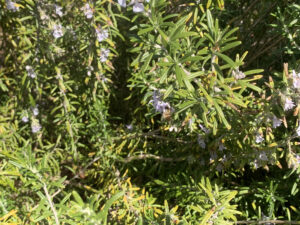Can You Recommend an Easy-to-Grow Herb Plant?
go.ncsu.edu/readext?980626
en Español / em Português
El inglés es el idioma de control de esta página. En la medida en que haya algún conflicto entre la traducción al inglés y la traducción, el inglés prevalece.
Al hacer clic en el enlace de traducción se activa un servicio de traducción gratuito para convertir la página al español. Al igual que con cualquier traducción por Internet, la conversión no es sensible al contexto y puede que no traduzca el texto en su significado original. NC State Extension no garantiza la exactitud del texto traducido. Por favor, tenga en cuenta que algunas aplicaciones y/o servicios pueden no funcionar como se espera cuando se traducen.
Português
Inglês é o idioma de controle desta página. Na medida que haja algum conflito entre o texto original em Inglês e a tradução, o Inglês prevalece.
Ao clicar no link de tradução, um serviço gratuito de tradução será ativado para converter a página para o Português. Como em qualquer tradução pela internet, a conversão não é sensivel ao contexto e pode não ocorrer a tradução para o significado orginal. O serviço de Extensão da Carolina do Norte (NC State Extension) não garante a exatidão do texto traduzido. Por favor, observe que algumas funções ou serviços podem não funcionar como esperado após a tradução.
English
English is the controlling language of this page. To the extent there is any conflict between the English text and the translation, English controls.
Clicking on the translation link activates a free translation service to convert the page to Spanish. As with any Internet translation, the conversion is not context-sensitive and may not translate the text to its original meaning. NC State Extension does not guarantee the accuracy of the translated text. Please note that some applications and/or services may not function as expected when translated.
Collapse ▲There are several herbs that you can grow in the landscape. Most of these would fall into the annual category, however, meaning that you would need to replant them every year. Annual herbs would include basil, parsley, dill, and cilantro to name a few. Being annuals, these plants are more forgiving because they only last one season. If you have an issue with growing annuals, you can move them or replant them without losing too much.
Perennial herbs are a little different in that respect. These are plants that will continue to grow from year to year. A few examples of perennial herbs are Thyme, oregano, sage, mints, chives, garlic chives, and rosemary. Many of these plants are fairly easy to grow and encourage pollinator activity. Garlic chives are a wonderful addition to your flower beds. They flower in late summer and boy do the pollinators flock to them when they do!

Rosemary growing in the Teaching Garden located at the N.C. Cooperative Extension, Beaufort County Center. Gene Fox
One of the greatest plants you can grow in your landscape is rosemary (Rosmarinus officinalis). This is a very functional, edible, and medicinal herb that can fit into your existing ornamental beds. Being native to the Mediterranean, rosemary is an evergreen plant that is very drought tolerant after being established. The plant prefers moist, well-drained soil and direct sunlight. Rosemary displays beautiful small flowers this time of year to give winter interest. The leaves are small and very fragrant when crushed. Rosemary will spread so make certain to give it plenty of room in the beds. These plants can also be grown in containers and will do just fine. Make certain however to not let them dry out. Container plants, as a general rule, require much more water than plants grown in soil.
Popular cultivars to be on the lookout for are ‘Gorzia’, ‘Tuscan Blue’, ‘Salem’, and ‘Arp’. ‘Gorzia’ has leaves that are double the size of most rosemary varieties. ‘Arp’ has the best cold tolerance of the cultivars. ‘Tuscan Blue’ has strong upright stems that can actually be used as skewers for grilling. ‘Salem’ grows to 4’ or 5’ with dark blue flowers.
If you are interested in incorporating edible plants into your landscape, many of these plants will work great for you. However, we always circle back to “Right Plant, Right Place”. If you are looking for a plant or would like to know more about a particular plant visit the new NC State Plant Toolbox. Here you can learn about the cultural needs of a plant such as whether it is drought tolerant or maybe it needs to be in an area of part-shade. This site will also tell you whether a plant is native, deer tolerant, wildlife friendly, or even if it has poisonous parts.
An alternative to looking yourself is to contact a Certified Master Gardener℠ Volunteer in Beaufort County to discuss your plans or concerns about particular plants. Master Gardener Volunteers go through classroom training and must successfully complete a 40-hour internship before earning their certification. These volunteers are very knowledgeable and enjoy giving back to the community. Master Gardener Volunteers have worked really hard to provide examples in our teaching and herb garden located at the N.C. Cooperative Extension, Beaufort County Center.
If you are having trouble with growing in your home landscape, call the Extension office at (252)946-0111 or email Gene Fox at gene_fox@ncsu.edu. I will have a commercial ornamentals and turf class coming up in February. If you need pesticide
or landscape contractor credits, please keep an eye out for details on this class. I am also planning to have a series of classes (click here to register) beginning in February that will go into soils, fruits, vegetables, ornamentals, and lawns. Keep an eye on our website or the Beaufort County Master Gardener Facebook page for more details. Until then, Happy Gardening!



